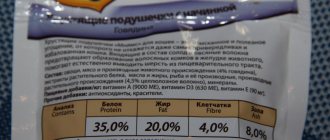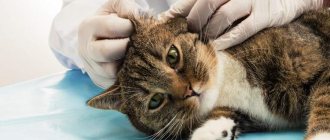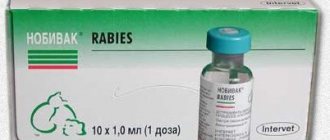If you are the owner of a representative of the cat family and live in a private house, or four-legged pranksters live in your neighborhood, then you should be prepared for the fact that you may have some problems. After all, cats love to “manage” other people’s property. In order to prevent this possibility, there are several simple and effective means of repelling cats. We'll tell you what smells they don't like and how to use them.
What smells do cats not like?
Natural repellents include a large number of products that are on hand. The stronger the aroma, the more the cat dislikes it:
- seasonings and spices (cloves, thyme, rosemary, cinnamon, ginger, bergamot, black pepper, cayenne pepper);
- different types of citrus fruits (orange, lemon, grapefruit, tangerine);
- vegetables with a strong smell (onions, garlic);
- table vinegar , diluted in water in proportions 1:1;
- essential oils (citrus, lavender, rosemary, rue, lemongrass, mustard, pennyroyal, tea tree).
Citrus
The citrus repellent method is very simple to use. Orange peels (or peels of other citrus fruits) must be placed in the cat’s “favorite” places - recesses in furniture, the space behind the chest of drawers or flower pots.
Sometimes fruit peels have varying degrees of effects on your pet. Their repellent effect can only be determined experimentally - alternate fruit peels, thereby determining which smell will be more unpleasant to the cat.
Reference! A furniture polish with a citrus scent may come in handy around the house.
Essential oils
Most essential oils have a strong, spicy aroma that cats cannot tolerate. Therefore, almost all essential oils can be used as a repeller. One of the most effective is rosemary oil.
Important! You need to use essential oil very carefully, as it can cause allergies in your pet.
A few drops of oil are added to a liter of water, mixed thoroughly (since water and oil are two immiscible liquids) and sprayed onto the affected areas of the pet.
Important! Valerian essential oil is one of the cat's favorite scents and has no repellent effect.
Onions and garlic
Every housewife has a head of onion or garlic in her supplies. These two vegetables are among the favorite natural cat repellers. Onions and garlic contain organic sulfur compounds, which give them such an unpleasant odor.
It is necessary to grate a head of onion or garlic and place it (for example, in saucers) next to indoor plants, near a country house, in flower beds or furrows of a garden bed. It should be noted that the smell of onions and garlic is unpleasant not only for cats, but also for people.
Seasonings and spices
The most effective, but more dangerous method of repelling with pepper.
It is best to take peppercorns and crush them yourself. Next, pour the pepper mass with a glass of warm water and boil. After cooling, pour the liquid into a spray bottle, shake and spray on areas undesirable for your pet.
Important! The method is dangerous because it can injure the animal, cause an allergic reaction and irritation of the mucous membranes of the eyes, nose and mouth.
Dried lavender
One of the most unpleasant smells for a cat is lavender. It is necessary to take dried inflorescences, as they have a sharper smell and take longer to dissipate compared to fresh flowers.
You can use inflorescences of herbs and plants such as thyme, rosemary, cloves, and ginger. It is enough to dry the flowers and place them in places where your pet is mischievous.
Vinegar
Vinegar has such a pungent and unpleasant odor that it eliminates the smell of urine in the area marked by the cat. Therefore, this method has found wide application. A solution of vinegar essence or vinegar with water is prepared in a 1:1 ratio. It can be used to wash wooden, tiled and concrete surfaces. The main thing to remember is that our pets are more sensitive to the properties of caustic substances.
Perfumes and alcohol
The smell of alcohol, like other repellents, has an unpleasant odor for cats. With its help, you can wean your pet from walking on tables and “shitting” in undesirable places. For example, you can leave a saucer with any strong alcohol or ethyl alcohol on the table surface. You can also spray the liquid on certain areas. Alcohol evaporates quickly, so re-processing is possible.
The aroma of not only perfume (especially strong odors), but also various deodorants scares away cats. Sometimes a pet may have a dislike for a certain person because of their cologne, antiperspirant or eau de toilette.
When using perfume as a deterrent, it is better to choose citrus, menthol, lavender and pine scents. To do this, you need to soak a napkin or cotton pad with the product and place it on your pet’s “favorite” place.
How to use repellent odors at home?
It’s not enough to know what smell cats can’t stand. You need to check if your pet is allergic to it. You need to treat the surface with a small amount of the drug and observe the pet’s reaction. A slight increase in salivation and lacrimation is allowed, which disappears as soon as it leaves the area of action of the smell. If a cat exhibits signs such as rhinitis, sneezing, shortness of breath, weakness, lethargy, etc., you need to immediately remove him from the room, then carry out a wet cleaning and ventilate the apartment well. If symptoms persist, the animal should be seen by a veterinarian.
Surface treatment rules:
- Cleaning the premises. It is necessary to remove traces and the smell of the cat’s vital activity from the marked areas so that the pet no longer associates them as places for the discharge of natural needs. Detergents with alcohol, homemade solutions with citric acid, soda and potassium permanganate remove odors well. After cleaning, the room must be ventilated.
- Application of a substance with a repellent odor. You need to wipe the surface with a solution of essential oils, herbal decoction, etc., and then place pieces of cotton wool soaked in the same substances near it. It is necessary to periodically change the cotton wool, as the smell gradually disappears. It is necessary to treat only those areas that the cat has chosen, because a pet that is followed by an unpleasant odor everywhere becomes restless and irritable.
Next, you need to observe the cat’s behavior - this will allow you to determine why he is marking his territory. If, after the ban, he began to relieve himself in the owner’s favorite chair, the matter is most likely a desire to maintain his authority or resentment.
Industrial products
Industrial cat repellents are mainly presented in the form of chemical aerosols and sprays. Their functions are varied. For example, protecting shoes, furniture, walls, floors and even the most secret corners in the house from an unwanted place for a pet to defecate. Sprays are also used to eliminate the unpleasant odor of cat urine.
It is best to choose products with natural composition:
- Water is the main component of a chemical spray or aerosol.
- Eucalyptus (lemon, lavender, castor, rue) oil – gives the compound a characteristic pungent odor that repels pets.
- Glycerin is an emulsifier - an auxiliary substance for mixing immiscible liquids. For example, water and essential oil.
The controversial component in the spray or aerosol is methylchloroisothiazolinone. This substance belongs to the group of synthetic preservatives that destroy bacteria, fungi and mold. It is a powerful allergen and toxic to cells of the immune system of animals and humans. The presence of this component in deterrents can cause severe allergic reactions and dermatitis.
How to scare away from the garden
If cats get into the habit of digging holes in the garden, you need to make a decision immediately. The easiest option is to buy a special primer. It contains particles of urine from predators, which the cats will not want to smell twice. When purchasing such products for gardeners, you need to read the instructions and make sure that the product will not harm the vegetation in the garden.
The already mentioned rue can be planted in a summer cottage
It is important to distribute the bushes evenly, without giving the cat room to walk. Another plant whose smell cats don’t like is mint.
Beautiful bushes will not only protect the plants surrounding them, but will also give the area an interesting twist.
Mint - the embodiment of horror
To treat things that cats mark at, you need to prepare the following decoction:
Mix
- Kavandu;
- Rosemary;
- Cayenne pepper.
This mixture is used to treat benches, legs of garden furniture and other equipment that cats frequent.
Rating of cat repellent sprays
| Spray name | Distinctive feature | Price |
| Spray 8 in 1 “Nature's Miracle” | Eliminating odors of marks and urine in the toilet, deterring further mischief | 550 rub. Check the price in the store |
| Doctor Vic | Low price and content of natural essential oils in the composition | 215 RUR Check the price in the store |
| Beaphar “Stop – it Cat” | Contains methyl nonyl ketone. Effective against marks from adult cats. | 750 rub. Check the price in the store |
| Biovax “Shit? No!" | Effective kitten repellent | 125 rub. Check the price in the store |
| Faithful friend “4 in 1” | Multifunctional product with a pleasant aroma for humans | 150 rub. Check the price in the store |
Spray 8 in 1 “Nature's Miracle”
The spray contains essential oils of lemon and thyme - repellent components. Designed for cleaning surfaces damaged by pets. Wet the area to be treated generously and leave for 10 minutes, then remove the moisture with a napkin. Good for removing stains. Effective for scaring away and weaning cats from shitting. But the spray must be used in the absence of children and people with hypersensitivity to odors.
Doctor Vic
Repellent based on essential oil of rue tree to correct the behavior of a pet. Apply to the surface of furniture, floors, flower pots at a distance of approximately 30 cm. Treatment is carried out once a day until the cat stops approaching the treated area. Effective in repelling cats, but may cause an allergic reaction in humans.
Important! Do not spray directly onto houseplants, flowers or soil.
Beaphar “Stop – it Cat”
The main active ingredient is methylnonyl ketone. Apply to objects, furniture and floors once a day until the cat’s bad habit is completely eliminated. Preferably used for adult cats. Effective in combination with an attractive spray.
Biovax “Scare away? Yes!"
Contains essential oils of tea tree and cinnamon. Designed to protect furniture, wallpaper, floors. The surface is treated once a day at a distance of 20 cm. It is effective only for scaring away kittens. Adult animals do not react at all.
Important! Do not apply to animals or plants! May cause allergic reactions in humans.
Faithful friend 4 in 1
The spray contains essential oils of lavender and tea tree, which is the main deterrent component of the product. It is designed to protect furniture, walls, and floors from being scratched and marked by a pet. Spray over the surface at a distance of 25 cm. Apply 1-2 times a day. It has a pleasant aroma that does not irritate human mucous membranes. Has no visible effect of repelling unneutered cats.
Scents that are attractive to cats
There are smells that cats like. For example, human sweat. It contains certain hormones, similar to natural pheromones, secreted by individuals of the opposite sex during sexual activity or when animals are ready to reproduce. This aroma has a calming effect on fluffies.
You may notice that if the owner comes from the street, the cat rubs against his legs, clothes, and tries to climb into his arms. This is how animals try to block out foreign odors, so they often mark the personal belongings of their owners.
Cats love the scent of valerian. It attracts cats, adult cats, but kittens, on the contrary, may find it unattractive. The medicinal plant contains substances (nepetalactone, actinidin) that resemble sex hormones that cats secrete during the rut.
Using unpleasant aromas that can scare away a cat, it is very easy to stop cats from shitting in inappropriate places. Be patient and act consistently. If you find your pet at the crime scene, do not use physical force. Scold him in a stern tone, lightly poke the cat's nose into the puddle, and take him to the litter box. Cats are very smart animals and will quickly understand what their beloved owner requires of them.
Source
DIY repellent
Homemade repellents are sometimes no worse than industrial ones. You will need products that can be found in any kitchen.
Lemon juice repellent
Strain the juice of one lemon to remove seeds or remaining fruit. Mix with a glass of water and pour into a spray bottle. Shake the bottle and treat the damaged surface (furniture, floor, flower pots). Repeat the procedure until the effect appears.
Coffee grounds repellent
Sprinkle the coffee grounds with the juice of one lemon. Add a couple of drops of any essential oil (citrus, lavender, tea tree). Mix the resulting slurry thoroughly, form into balls and place in places undesirable for your pet.
Any cat knows how to approach its owner. And the owner must reciprocate his pet’s feelings. In this he will be helped by means that allow him to correct the non-ideal behavior of a small predator. They will make a person and a mustachioed pet friends.
How to stop a cat from shitting in a flower pot
Many owners encounter this problem. This is due to natural reflexes as they try to bury their mark. There are several ways to stop peeing in the potty.
- Insulate flower pots. It will be difficult, but possible. And then the furry one will lose access to his toilet.
- Use citrus peels. You can throw the peels of oranges or tangerines on the ground in a flower pot. Cats cannot stand this smell.
- Install a cat guard that blocks access to the soil in the pot. It is quite simple to install, and the beast will stop its attacks on the flower.
Flower protection
Recipes
Repellent compounds that you can make yourself:
- The juice of one lemon is mixed with a glass of water. Pour into a spray bottle and spray on problem areas.
- Crush the peppercorns and boil with 1 glass of water. Filter, spray.
- Take 2-3 drops of essential oil per 1 liter of water, stir thoroughly and spray.
- Coffee grounds are mixed with lemon juice, 1-2 drops of lavender, rue or eucalyptus oil are added. Form balls and place them in places of possible marks.
- A 35% solution of vinegar essence is suitable for neutralizing dirt from concrete, wood, and tiled surfaces. You can wash the floor stained with excrement in the entrance, then spray it with a synthetic repellent spray.
- Garlic and onion are grated or finely chopped. Place them on saucers in the corners of the rooms, near indoor flowers.
- Essential oils of lemon, rosemary, lavender are diluted with water in a ratio of 1:3 and mixed thoroughly. Pieces of fabric soaked in the composition are placed in problem areas.
- The pet's habit of climbing on tables is eradicated by leaving alcohol in the dining area. The smell of alcohol disappears quickly; the liquid has to be renewed several times a day.
- Ground black and red pepper is recommended for use in open spaces. For example, to protect garden beds from uninvited guests. In an enclosed space, a caustic suspension can cause burns to the mucous membranes and provoke an attack of coughing and sneezing.
- Take 2 drops of lemon, lavender, orange oils and mix with 60 ml of water. Spray from a spray bottle.
- Boil citrus peels with half a liter of water for 20 minutes. Allow to cool, add lemon juice and 1 tsp. dishwashing detergents.
- A solution of potassium permanganate and citric acid will help get rid of the persistent odor of urine.
- An infusion of onion peels mixed with tart cologne creates an extremely unpleasant aroma for cats.
Each animal is individually intolerant to a certain smell. You have to experiment to be successful. The use of folk remedies is preferable. They do not contain synthetic additives.
Citrus
For humans, the smell of lemons, grapefruits and oranges is a hundred times more pleasant than the “fragrance” of garlic, but for some reason cats really don’t like the citrus aroma. Fresh orange peels laid out on the windowsill between flower pots completely discourage cats from digging in the ground, and spraying upholstered furniture with water and some citrus essential oil prevents pets from encroaching on these home furnishings.
Cats can't stand the smell of citrus fruits.
The smell of citrus fruits is so unpleasant for cats that especially smart tailed pets only need to splash juice from a fresh lemon peel into their faces a couple of times at the moment when they sharpen their claws on the sofa, for them to learn their lesson and stop such entertainment forever.
Prerequisites for the development of an acute sense of smell in cats
It is well known that a sensitive sense of smell is one of the strengths of felines. The ability to track their prey by the scent it emits has been developed by wild cats for centuries, so that it can be passed on to our pets in finished form. Unlike humans, who often rely on their eyesight, the most developed feline skills include smell and touch.
In natural conditions, a keen sense of smell allowed cats to survive in conditions of food shortage
This choice is explained by natural necessity. To clarify it, it is necessary to turn to the wild ancestors of our pets. Wild cats preferred to hunt at night - this rule applied to both forest and desert felines. This way they avoided the watchful gaze of larger predators, and gained superiority over their prey, having the ability to identify it by smell over long distances and take the animal by surprise.
In the cold months, a keen sense of smell saved Amur cats from starvation
Impact of infant blindness
The predominance of smell over all other ways of cognition of the environment is also explained by infantile inclinations. Kittens are born blind, so from the first days of life they are faced with the question of effective orientation in space.
Kittens are forced to learn how to survive even before their eyes open.
Kittens are saved from confusion and complete defenselessness by their tiny noses, with which they are already able to smell their mother’s scent, distinguishing it from hundreds of others. Consequently, kittens get to know both their parents and brothers and sisters primarily by smell.
Tips and tricks
Before you scare away cats with different scents, so as not to shit or mark the territory, you need to remove the cat smell. To do this, you can use commercial products to remove it or regular vinegar. The entire area that the cat used for its needs, as well as everything located around it, is thoroughly washed. Soda and its aqueous solution, which are used to wash floors or furniture, also absorb odors quite well.
When using this or that substance against cats, it is advisable to first let your pet smell it. This will make sure that the smell is really unpleasant for the animal, but does not cause allergies. Do not use toxic substances such as naphthalene. This may harm the cat's health.
There are many smells that cats avoid. However, when using them, it is important not to overdo it, because there should not only be prohibitions, but also a certain free territory.
Essential oils
Natural essential oils from the plants listed above that are unpleasant to cats can also repel animals from prohibited areas. Oil dissolved in water is often used to spray and lubricate surfaces. A solution of 10 drops of lemon oil, 20 drops of rosemary oil and 1 liter of water has become widespread.
Essential oil can also be added to water for washing floors or wet cleaning. It is important to take into account that the cat must have the allowed space without an unpleasant odor. Otherwise, he will simply have to endure it constantly without the possibility of avoiding it. Behavior will definitely not get better from this.
conclusions
So, we figured out what smells cats don’t like. Cunning is a good way to avoid war. In this case, wars with cats constantly visiting objects that they need to beware of, so that the owner associates the pet exclusively with positive things.
What conclusions can be drawn?
- The most universal remedy is citrus fruits. This is the smell that repels cats with a 100% guarantee. If you put a lemon peel near a certain place, the cat will stay away from it.
- Although onion, garlic and vinegar are effective, it is best not to use them. Although the latter can remove the smell of cat urine.
So we figured out what smell cats don’t like. Good luck with your pets.











